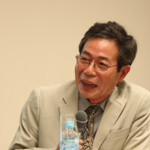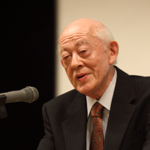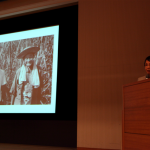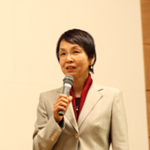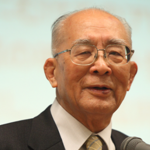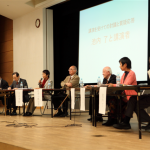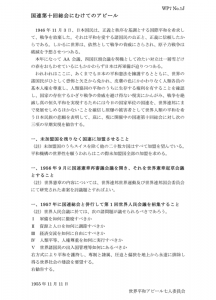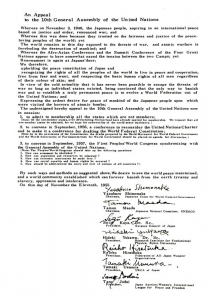His Excellency Mr. Yasuo Fukuda, Prime Minister, Japan
His Excellency Mr. Stephen Joseph Harper, Prime Minister, Canada
His Excellency Mr. Nicolas Sarkozy, President, French Republic
Her Excellency Ms. Angela Merkel, Chancellor, Federal Republic of Germany
His Excellency Mr. Silvio Berlusconi, Prime Minister, Republic of Italy
His Excellency Mr. Dmitry Anatolyevich Medvedev, President, Russian Federation
His Excellency Mr. Gordon Brown, Prime Minister, United Kingdom
of Great Britain and Northern Ireland
His Excellency Mr. George Walker Bush, President, United States of America
His Excellency Mr. Jose Manuel Durao Barroso, President, European Union27th June 2008
The Committee of Seven for Appeals on the World Peace
Kinhide Mushakoji, Hideo Tsuchiyama, Yoshino Oishi,
Hisashi Inoue, Kayoko Ikeda, Michiji Konuma, Satoru Ikeuchi
We, the Committee of Seven for Appeals on the World Peace calls upon the G8 Leaders who
gather at Toyako, Hokkaido in July 2008, to base their decisions on an accurate understanding about the
root causes of the problems under consideration in full awareness of the responsibility of the industrially
advanced nations towards the international community.
The world is now undergoing a deep crisis. The inflating price of crude oil and food create serious
human insecurity, and the economic and social gaps continues to widen. All these trends cause domestic
social unrest and a danger of military conflicts.
In order to remove such worldwide insecurity, democratic and just international relations should be
developed among States with a constructive cooperation of the civil society. In this process the
industrialized nations have a particularly important role to play. We propose the following
recommendations so that your deliberation could lead to constructive conclusions about the protection of
the global environment, the regulation of international finance, the international promotion of human
rights, and the abolition of nuclear weapons.
1) Environment measures taking into consideration the points of view of the vulnerable peoples
We welcome the inclusion in the Summit agenda of efforts to cope with global warming. The G8
Governments representing the powerful sector of the world community, also in terms of environment
protection, have a particular responsibility towards the international community to take into consideration
the points of view of the vulnerable peoples.
We find it unfortunate in this connection that the Summit agenda puts an emphasis on targets and
solutions only of technical issues such as CO2 reduction, and does not seem to realize the importance of
the impacts of global economy which affects all the aspects of the global ecology.
For example, Japan, the host government of the Summit, proposes to deliberate on the inseparable
connections between the problems of global warming and of food. We appreciate this concern, but cannot
overlook the fact that the proposition centers on the development of high-yield food grains and transfer of
technology to the developing countries. This emphasis on technical solutions should not divert the
deliberation from the speculative money game which causes the inflating prices of crude oil and grains.
The problem of bio-fuel which endangers food supply of the poor sectors of the societies deserves also
special attention.
We recognize the intention of the Summit to get the support of the developing countries by
stressing the compatibility between environment protection and economic development. However, the
media reports that the deliberation with the developing nations preparing the Summit focused mainly on
matters related to technology transfer to the developing countries. It is indispensable to take into
consideration the fact that the poor sector of the developing regions, the minorities and the indigenous
peoples, and among them especially women and children, are already made victims by the calamities
caused by global warming and will increasingly be affected by these trends. We recommend that the
Summit should develop a serious discussion on how to support those vulnerable peoples trying to
overcome their socio-economic vulnerability, and the international civil society efforts to build, together
with them, an international system for the prevention of natural calamities caused by global warming.
We recognize the fact that the barter of CO2 emission rights has a certain effect for environment
protection, but we wish to draw the attention of the Summit to the financial danger which may face the
developing countries by the flow of speculative money accompanying these transactions.
2) Opposing the human rights violations accompanying the War “on Terror”.
We are deeply concerned by the Summit deliberation about preventing measures against terrorism
and internationally organized crime. The War “on Terror” gives priority to punishment and elimination,
surveillance and suppression of terrorists rather than to the elimination of the socio-cultural,
economic-political root causes of terrorism. This over-emphasis on the military and police measures
which only react to immediate threats is a serious matter of concern we cannot avoid to mention.
Nowadays, a global surveillance system covers from street-corners to the outer-space. The camps
to question secretly terrorist suspects, as well as camps to intern refugees and “illegal” migrants,
generated by global rich-poor gaps, are established on the border regions between the rich North and the
poor South. A new “Iron Curtain” seems to have appeared. An over-emphasis on the security of the
industrial regions results in measures increasing the insecurity and the despair among the impoverished
sectors of the developing countries. These measures combined with the growing rich-poor gaps, in both
North and South, increase social unrest and may become a source for terrorism and criminality.
We strongly urge the Summit to overcome the idea of a War “on Terror” and rather aim at
building a world where all peoples could live in peace. We hope that the G8 Leaders recognize their
responsibility in this global endeavor.
3) We call for the Nuclear Weapon Countries to implement Nuclear Disarmament.
We are seriously concerned that the nuclear weapon countries do not deny the possible use of their
nuclear weapons. If nuclear weapons will be used in any circumstances it will be the greatest mass
destruction of environment in all human history. In this sense we support, with no reservation, nuclear
non-proliferation which will be discussed at the coming Summit.
However measures only on the non-proliferation are not enough. The borders between peaceful
use and the military use of nuclear powers are mixed up and vague in these days. It is impossible to
accomplish a thorough nuclear weapon non-proliferation as far as any countries continue to possess
nuclear weapons as a security measure, or to admit the nuclear missile bases in their territories, or to
depend on nuclear umbrellas.
We urge that all leaders of the Group of Eight should acknowledge the undertaking on effective
measures relating to nuclear disarmament and the other measures stipulated in the Article VI of the NPT
and they should adopt a clear working program for this purpose and execute it as quickly as possible..
We urge that the G8 leaders should support actively a proposal by Mr. Kevin Rudd, Prime Minister of
Australia, to establish an International Commission on Nuclear Non-Proliferation and Disarmament
announced on 9th June 2008 in Kyoto, and the Group of Eight countries should cooperate with the
Commission.
Footnote 1. The Article VI (Full Text) of the NPT (Treaty on the Non-Proliferation of Nuclear
Weapons)
Each of the Parties to the Treaty undertakes to pursue negotiations in good faith on effective measures
relating to cessation of the nuclear arms race at an early date and to nuclear disarmament, and on a Treaty
on general and complete disarmament under strict and effective international control.
Footnote 2 The Proposal of Mr. Kevin Rudd, Prime Minister of Australia
Mr. Kevin Rudd, Prime Minister of Australia, Proposed to establish an International Commission
on Nuclear Non ?Proliferation and Disarmament, on 9th June 2008 in Kyoto, Japan. It was his
second day and the second city of his official visit to Japan. He visited first Hiroshima In his
speech he mentioned that the Commission will re-examine the Canberra Commission and the Tokyo
Forum reports to see how far we have come, how much work remains, and develop a possible plan
of action for the future.
The Canberra Commission on the Elimination of Nuclear Weapons was established as an
independent commission by the then Australian Government in November 1995 to propose practical
steps towards a nuclear weapon free world including the related problem of maintaining stability
and security during the transitioned period and after the goal is achieved. Their detailed report was
published in August 1996.
The Tokyo Forum on Nuclear non-Proliferation and Disarmament was established by the
initiative of the Japanese Government in 1998. The experts from 18 countries concluded the
final report including 17 proposals in July 1999.
Contact: Michiji Konuma (member; Secretary General)
200-9 Kudencho, Sakaeku, Yokohama 247-0014 Japan
Fax: +81-(0)45-891-8386
e-mail: mkonuma254@m4.dion.ne.jp
URL: http://worldpeace7.jp

